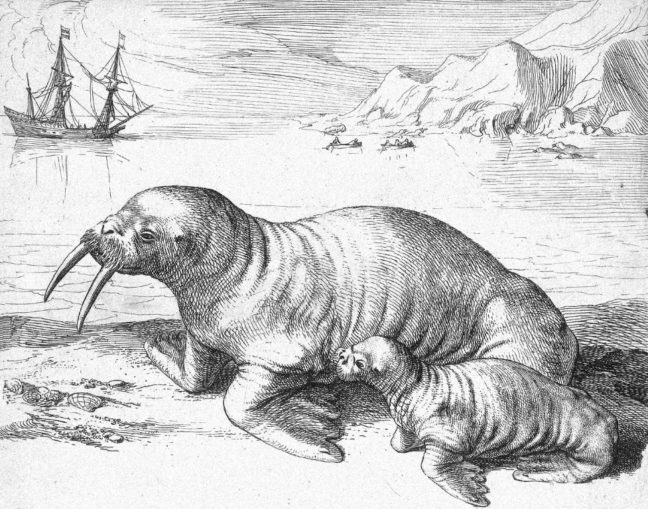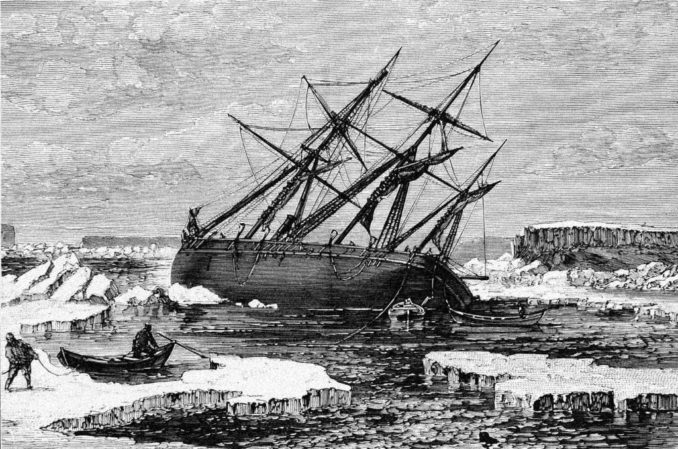June 13th, 1810 (June 1st O.S.).
We have left Novaya Zemlya, to general relief, and are sailing down the west side of the island to resume our eastward course. No one enjoyed our sojourn in this Godforsaken place, least of all the bears who found themselves enemies of the inhabitants.
Our supplies are replenished with what was on offer, so at least we have plenty of preserved seal meat (though even the polar bears think this is poor stuff) and extra gunpowder for exploding icy obstacles.
The temperature has risen since we arrived, and at present there is little ice to be seen. From what the inhabitants tell us, there will be more as we sail east. But we are well prepared, and have every hope that we can pass through it. As Sophocles wrote, Ἐλπὶς γὰρ ἡ βόσκουσα τοὺς πολλοὺς βροτῶν, For it is hope that maintains most mortals.
June 15th, 1810 (June 3rd O.S.).
Turning east through an unnamed strait, we find ourselves in uncharted waters, visited only by whaling ships.
The Dutch explorer Willem Barents penetrated a short way into this sea in 1597, but died among his scurvy-ridden crew who ran for home with their mission unaccomplished, less than a quarter of the way along the course they had planned to reach the eastern tip of the continent.

We will sail due east unless we are turned south by ice, and at some point we should find the coast of the mainland, after which we will keep close to it as far as we can. The farther we keep to the south, the less ice there should be. The ship’s chronometer and a noon sighting tell us that we are now at 60° east, and a light westerly breeze carries us along in open water under a blue sky and the warming rays of the sun, low in the heavens in these northern latitudes despite the date being near to midsummer. Even this sluggish vessel seems willing to go, and all the crew are filled with hope of new discoveries. But one should remember the warning of Cleobulus, Εὐτυχῶν μὴ ἴσθι ὑπερήφανος, ἀπορήσας μὴ ταπεινοῦ, Be not elated by good fortune, nor downcast by adversity.
June 20th, 1810 (June 8th O.S.).
Yesterday we made landfall, on a coast running from north to south at 67° east by our reckoning – how quickly we notch up degrees in these Arctic latitudes! Thinking it might be merely an island, we sailed south, only to find that the coast curved and forced us back the way we came. So we have assumed that it is a peninsula and turned north again, hoping to sail around its northern extremity.
Pack ice often slows our progress. We encountered walruses on a floe, but they offered no guidance as to our best route.

June 22nd, 1810 (June 10th O.S.).
We continue to sail northwards, and are now at 72° north, the nearest to the Pole that we have ever been. Surely this promontory cannot continue for ever.
Poor seasick Dmitri was vomiting over the side when he leant too far and fell into the freezing sea, whose chill can kill a frail human in a few minutes. Fortunately Nikita and Beaivi, who were in the rigging on that side of the ship, saw him go and immediately dived in as we hastily hove to and lowered a boat. Swimming as only polar bears can, they swiftly brought him back and carried him up a straining rope ladder – the size of polar bears is a real test of our cordage. We stripped off his clothes, wrapped him in blankets, put him next to the galley stove, and plied him with heavily sugared tea laced with spirits to help him recover from the shock. By the time he had stopped shivering he was laughing about his brush with Death. Euripides reminds us, Ἡδὺ τοι σωθέντα μεμνῆσθαι πόνων, It is sweet to remember troubles when you are in safety.
June 24th, 1810 (June 12th O.S.).
At last we have come to the northernmost extremity of this obstructive peninsula, and are resuming our eastward course through a strait to the south of an island. On both sides the land is flat, barren and icy, offering no landmarks, and our only clues to our position on the globe are what our chronometer and sextant tell us. We have almost reached 71° east and, if a magic carpet were to bear us due south, we would find ourselves in western India. But we have no magic to aid us, and we are still far from a destination of which we know almost nothing.
Nevertheless, all the crew, bears and men, are in high spirits as we sail into the unknown. We have ample stocks of food and drink, and there is music and dancing. Dmitri is no longer sick after his involuntary salt water cure. It is remarkable how a shock can reform the mind.
June 30th, 1810 (June 18th O.S.).
We are in sight of the coast again. Its angle drives us ever northwards, and we are already at 75° north and the ice is thickening. We pass to the south of what seem to be scattered islands, though in these latitudes it is hard to distinguish between islands and icebergs.
July 1st, 1810 (June 19th O.S.).
Staying close to the shore has its disadvantages. The winds we have been encountering are light and variable, and there is little danger of being driven on to a lee shore and wrecked by a gale. But there is a constant risk of striking some projection in the shallow water, and that is what we have done.

The tide in these regions rises and falls only a few feet, owing to the obliquity of the tidal pull from the moon, and its timing is strangely irregular. Nevertheless, we are stranded on a mud bank in a falling tide, and must wait for it to rise again before we can contrive to get ourselves off it.
July 2nd, 1810 (June 20th O.S.).
We are free, though it took the combined power of bears and men rowing as hard as they could in three boats to drag us off the obstruction at the top of the tide. The strengthened hull of the ship is completely undamaged, and we proceed on our way. However, we find increasing difficulty in threading our way through the pack ice.
Dolores is now feeling as sick as Dmitri did, though with a different cause. Apparently this is a usual event in human pregnancy, which makes me ever more glad to be a bear and free of such foibles – I never felt better than when I was carrying dear Bruin. However, she makes light of her troubles, and they will pass.
July 13th, 1810 (July 1st O.S.).
We are now at 78° north and 104° west, and most likely in a place where no ship has yet penetrated. If a crow flew due south from here – as any sensible crow instantly would from this barren icy waste – it would eventually find itself in Singapore; and in my weaker moments I cannot help wishing that we were there too.
The ice is no longer an impediment to our progress: it is a barrier. Yesterday we proceeded a few miles by going on to a floe and blowing it apart with gunpowder, but today the ice ahead of us is so dense that I fear we may have to wait for further melting as summer progresses. But melt it will, and we must not be impatient. Our ship is strong, and we have supplies for many months.
July 15th, 1810 (July 3rd O.S.).
Fast in ice, and free of the usual duties of the ship, we are free to disport ourselves as we please. The sailmaker has made us an excellent though strangely hairy football out of a seal’s bladder covered with its skin. We have also tried cricket, with a ball of cork covered in leather and a bat hewn out by the carpenter, but this has not been a success as the ball bounces oddly on the ice and the Russians are baffled by the game’s arcane rules.
However, everyone enjoys a quaint old English game called ‘base-ball’, which can best be compared to a circular game of cricket without wickets. The bowler stands in the middle and casts balls at the batsman, who may be anywhere in a ring of ‘bases’ marked around the perimeter and carries a rounded club like a larger version of a belaying pin. If the batsman strikes a ball with sufficient force to send the opposing fielders chasing it, he may run to the next base, or the one after that, and so on around the circle until the ball is brought back. If he does not reach a base in time, a ball thrown at the base will cause him to be run out, just as in cricket. It is all delightfully simple and easy to understand, and bears, Englishmen and Russians are all enjoying the game.
Needless to say, we bears have the upper hand in this sport, since we can both hurl and strike the ball with great force, and run like the wind. But by assigning equal numbers of bears and humans to each side we can make the game fair. I feel that if cricket had not somehow gained the ascendancy, base-ball might have come to be the sport of our nation. Maybe it will have greater success elsewhere.
July 25th, 1810 (July 13th O.S.).
The crew are beginning to fret in their icy prison, even the easygoing Fred. He was watching Jem polishing the compass binnacle, which did not need polishing but there was nothing else to do, and was quietly singing to himself ‘Why are we waiting?’ to the tune of Adeste fideles. ‘Will yer stop droning that bloody dirge!’ he snapped. Jem was taken aback and apologised, saying that he had no idea he was doing it. What a strange murky thing the human mind is, with its shallow and deep currents. Fred accepted his apology and the matter is closed, but it shows how everyone is on edge.
The Greeks and the Romans called the Arctic Sea the Sea of Cronos, the monstrous Titan who emasculated his father and devoured his children. Pliny called it Mare Pigrum, the idle sea, and others Mare Concretum, the clotted sea; while the Celts called it Morimarusa, which the Romans translated correctly as Mare Mortuum, the sea of the dead. All these names seem apt to us as we languish in its grip.
July 30th, 1810 (July 18th O.S.).
At last we are free! At dawn as usual, we sent a lookout to the main masthead, and he spotted clear water to the east. We have spent the rest of the day blasting a passage to it through the ice, firing mortar bombs to break the floes and give us a passage to the open sea. We have expended ten of the twenty-five bombs we had, but with good fortune we should not have to do this again.

Now we are under way, threading our course through loose floes with a lookout constantly up the foremast to advise us of obstacles. So far the path seems clear as we sail south-east to make landfall again and try to find the narrow strait discovered by Vitus Bering in 1728, which separates the eastern tip of Asia from the west coast of America. With the primitive reckoning of his time, Bering could not give an accurate reading of the longitude of this passage, but we know that it lies at 65° north, well to the south of our present position, and at about 168° west – that is, we have to go so far to the east that it becomes west again.
But our hearts are high, and we are all confident that we shall complete our mission, and escape this frozen region to break out into the Pacific Ocean and admire the wonders of the gorgeous east.
Copyright © Tachybaptus 2019
The Goodnight Vienna Audio file



